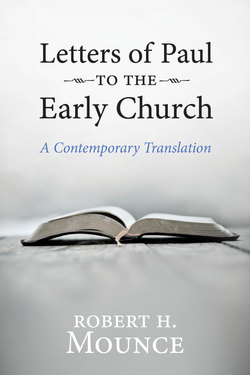Читать книгу Letters of Paul to the Early Church - Robert H. Mounce - Страница 5
На сайте Литреса книга снята с продажи.
Introduction
ОглавлениеNo one in the early church played a more influential role in the spread of Christianity than did the apostle Paul. A zealous adherent of Rabbinic Judaism, he was determined to get rid of that heretical group of Christians who went about proclaiming that the man Jesus Christ of Nazareth, who was put to death by the Roman overlords, had in fact risen from the dead. So Saul, as that was his Jewish name, set out for Damascus to take some of these rebels into custody. But he never finished his mission because suddenly he was struck blind by a light from heaven and this same Jesus who had risen from the dead spoke to him personally. That dramatic encounter changed the life of the Jewish zealot who then played the major role in the rapid western expansion of the Christian faith. It was the apostle Paul who wrote a number of letters to the churches scattered throughout what we now call Asia Minor and these letters have come to form the theological structure of Christian theology.
It has been a great joy to have been deeply involved with the apostle’s thinking for the past several years. My desire now is to place in your hands a readable English duplicate of those thirteen ancient Greek letters. As many know, translation philosophy runs all the way from a strict word-for-word approach to a very contemporary style. Both have their advantages. My intention in this work, however, is to communicate the truths that Paul intended rather than the specific words he used to convey them.
You say, “But that involves interpretation,” and you are exactly right. All translation is interpretation. The critical question is whether the translator has accurately conveyed what the writer intended to communicate. My intention to translate meaning involved a great deal of time in the best evangelical commentaries. I wanted this work to reflect the historic understanding of the text. You will discover that I rarely solve an ambiguity in a way that is not supported by more than one of these resources. Not only have I tried for, as Calvin called it, “lucid brevity” but wherever possible I have removed ambiguity. Every first year Greek student learns that there is both an objective and a subjective genitive and context is the ultimate arbiter. E.g., Is agape tou theou our love for God (objective genitive) or his love for us (subjective genitive)?
The great linguist Eugene Nida repeatedly emphasized that words bleed their meaning from context. In the vast majority of cases a given word is not limited to a single idea. For example, “fast” can be used in a number of ways: the runner ran fast, I believe I will fast this weekend, she is fast asleep, he lives a fast life-style, the color in this garment is fast, hold fast, etc. The word itself takes its meaning from context and that is where interpretation comes in. Good translation understands context, is sensitive to the author’s intention, and is committed to allowing context to determine word meaning rather than a preconceived theological point of view.
The apostle wrote the various letters over a period of some 12–15 years while carrying out his goal of taking the message to the Gentile world. They provide an unusually clear portrait of life of an itinerant evangelist in a hostile society. Any change in literary style reflects the condition of the church being addressed as well as the amanuensis used for that particular letter. The order of the letters reflects the probable dates of composition.
So here is my best understanding of what Paul wrote some two thousand years ago in a language different from ours and in a social setting quite distinct. I want the English equivalent to say exactly what Paul’s Greek conveyed to his first century readers. While that goal will never be accomplished perfectly, I trust that this translation moves in that direction.
Robert H. Mounce
